CHAPTER FOUR
Understanding a New Philosophy

So far, we’ve seen how even current technologies are driving vast amounts of information and changing behaviour. This has resulted in greater transparency, understanding and enlightenment which has, in turn, driven cooperation, wealth and a better understanding of challenges. As per the pattern we’ve established, it’s had the exact opposite effect as well – the overload can blind us. We’ve also seen how technology has accelerated economics, causing massive opportunities, and how at the same time it has caused overconsumption, debt and isolationism. We’ve also seen how the efficiencies brought by ‘on demand’ internet technologies raise expectations that we should demand the same speed from all other areas of our lives. The death of patience is upon us and with that comes the potential for great ignorance. Learning and listening require patience. When that is lost, experience and knowledge are also undermined and we enter a modern age of educated ignorance. We become fast-forgetters, where yesterday is gone, tomorrow hasn’t arrived and all that matters is now.
This plague of ignorance shows itself first as impatience. It that goes unchecked, it becomes anger, the parent of hatred and, eventually, violence. This is the negative consequence of the connectivity we enjoy. The more into the interrupted present we move, the more we’re pushed towards greater division and atomization driven by ever more left-brained thinking.
Great leaders cannot understand how to lead unless they first understand these dynamics. This also means investigating and understanding their own right-brain ability. You can never create a team at peace with itself with a leader who’s unaware of its importance. People need to feel they belong in the team. There are no psychometric tests for this. How can you measure patience, determination, sense of humour and character? All of these are highly correlated with successful leadership, but they are subjective, irrational and intangible, but nonetheless, important. The acquisition of these skills is more of an indicator of true intelligence than mere intellect.
In the 20th century, the provenance of so much mainstream thinking on physical health and well-being came from the fringe, for example homeopathic medicine, organic foods and environmentalism. In the 21st century, it will be no different in the philosophical and spiritual sphere. Meditation, mindfulness and holistic thinking will enter the boardroom not because it’s fashionable or weak-minded, but because it’s effective in defending organizational and community culture and values and in mitigating the atomization that we’re seeing.
This is what we will cover:
- What is intelligence?
- Intelligence as enlightenment
- The axis of leadership challenge
- Why (the f**k) is everyone so angry?
- How bad is the problem?
- The leadership opportunity
- A new commercial opportunity, too?
- Mainstream media make us angry
- Social media make us angry, too
- Disintermediation
- The leader’s critique
- Rule 34
- The case for mindfulness
- Resolving conflict
- Greed is good?
- The ultimate selfishness
- Empathy
- The process of non-doing
- The role of humour
- Creative provenance
- Conclusions
What is intelligence?
There are many definitions of intelligence but most include simply the ability to acquire and apply knowledge. The problem that intelligence faces is the rubric within which it works. Intelligence is usually synonymous with Western Reductionist thinking. The evidence of intelligence is codified in exam passes and degree awards but some, like Howard Gardner2 for instance, have begun to advance alternative theories. He said there were several types of intelligence (Figure 4.1).